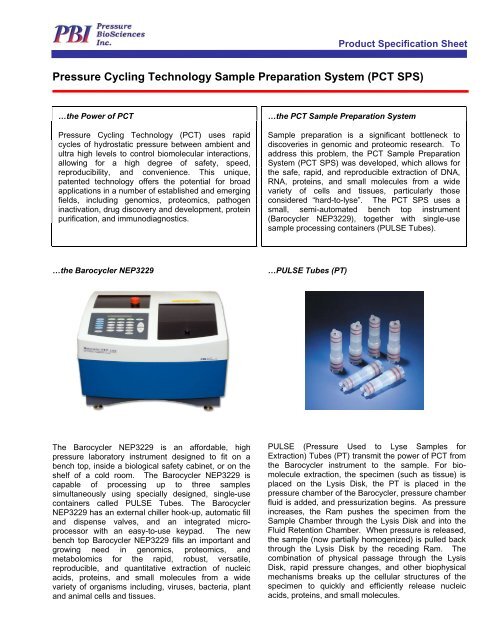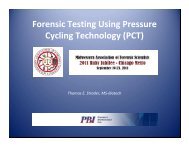Pressure Cycling Technology Sample Preparation System (PCT SPS)
Pressure Cycling Technology Sample Preparation System (PCT SPS)
Pressure Cycling Technology Sample Preparation System (PCT SPS)
You also want an ePaper? Increase the reach of your titles
YUMPU automatically turns print PDFs into web optimized ePapers that Google loves.
Product Specification Sheet<br />
<strong>Pressure</strong> <strong>Cycling</strong> <strong>Technology</strong> <strong>Sample</strong> <strong>Preparation</strong> <strong>System</strong> (<strong>PCT</strong> <strong>SPS</strong>)<br />
…the Power of <strong>PCT</strong><br />
<strong>Pressure</strong> <strong>Cycling</strong> <strong>Technology</strong> (<strong>PCT</strong>) uses rapid<br />
cycles of hydrostatic pressure between ambient and<br />
ultra high levels to control biomolecular interactions,<br />
allowing for a high degree of safety, speed,<br />
reproducibility, and convenience. This unique,<br />
patented technology offers the potential for broad<br />
applications in a number of established and emerging<br />
fields, including genomics, proteomics, pathogen<br />
inactivation, drug discovery and development, protein<br />
purification, and immunodiagnostics.<br />
…the <strong>PCT</strong> <strong>Sample</strong> <strong>Preparation</strong> <strong>System</strong><br />
<strong>Sample</strong> preparation is a significant bottleneck to<br />
discoveries in genomic and proteomic research. To<br />
address this problem, the <strong>PCT</strong> <strong>Sample</strong> <strong>Preparation</strong><br />
<strong>System</strong> (<strong>PCT</strong> <strong>SPS</strong>) was developed, which allows for<br />
the safe, rapid, and reproducible extraction of DNA,<br />
RNA, proteins, and small molecules from a wide<br />
variety of cells and tissues, particularly those<br />
considered “hard-to-lyse”. The <strong>PCT</strong> <strong>SPS</strong> uses a<br />
small, semi-automated bench top instrument<br />
(Barocycler NEP3229), together with single-use<br />
sample processing containers (PULSE Tubes).<br />
…the Barocycler NEP3229<br />
…PULSE Tubes (PT)<br />
The Barocycler NEP3229 is an affordable, high<br />
pressure laboratory instrument designed to fit on a<br />
bench top, inside a biological safety cabinet, or on the<br />
shelf of a cold room. The Barocycler NEP3229 is<br />
capable of processing up to three samples<br />
simultaneously using specially designed, single-use<br />
containers called PULSE Tubes. The Barocycler<br />
NEP3229 has an external chiller hook-up, automatic fill<br />
and dispense valves, and an integrated microprocessor<br />
with an easy-to-use keypad. The new<br />
bench top Barocycler NEP3229 fills an important and<br />
growing need in genomics, proteomics, and<br />
metabolomics for the rapid, robust, versatile,<br />
reproducible, and quantitative extraction of nucleic<br />
acids, proteins, and small molecules from a wide<br />
variety of organisms including, viruses, bacteria, plant<br />
and animal cells and tissues.<br />
PULSE (<strong>Pressure</strong> Used to Lyse <strong>Sample</strong>s for<br />
Extraction) Tubes (PT) transmit the power of <strong>PCT</strong> from<br />
the Barocycler instrument to the sample. For biomolecule<br />
extraction, the specimen (such as tissue) is<br />
placed on the Lysis Disk, the PT is placed in the<br />
pressure chamber of the Barocycler, pressure chamber<br />
fluid is added, and pressurization begins. As pressure<br />
increases, the Ram pushes the specimen from the<br />
<strong>Sample</strong> Chamber through the Lysis Disk and into the<br />
Fluid Retention Chamber. When pressure is released,<br />
the sample (now partially homogenized) is pulled back<br />
through the Lysis Disk by the receding Ram. The<br />
combination of physical passage through the Lysis<br />
Disk, rapid pressure changes, and other biophysical<br />
mechanisms breaks up the cellular structures of the<br />
specimen to quickly and efficiently release nucleic<br />
acids, proteins, and small molecules.
Specifications of the <strong>PCT</strong> <strong>SPS</strong>*<br />
Barocycler NEP3229<br />
Maximum <strong>Pressure</strong> 44 kpsi, 300 MPa Protocol Settings<br />
<strong>Pressure</strong><br />
Holding Time (up or down)<br />
protocol number<br />
Working <strong>Pressure</strong> Range<br />
5 to 35 kpsi<br />
Temp. Control 4.0 to 40.0 ± 2.0 °C<br />
Minimum <strong>Pressure</strong> 1 kpsi Number of Chambers 1<br />
Recommended <strong>Pressure</strong> Range 10 to 35 kpsi Number of PULSE Tubes per<br />
Chamber<br />
Ramp Time (up) ~3 kpsi/sec Dimensions<br />
Ramp Time (down) < 0.3 sec Weights<br />
3<br />
Top Unit: 19.0 × 17.5 × 27.5 in.<br />
Bottom Unit: 28.2 × 18.0 × 21.5 in.<br />
Top Unit: 157 Ibs<br />
Bottom Unit: 207 Ibs<br />
Power Requirement 120 VAC, 20 Amps, 60 Hz Laboratory Environment 15 to 35 °C, < 85% Humidity<br />
PULSE Tube FT500<br />
Dimensions 13 mm diameter × 51 mm long Compatible solvent<br />
Solvent that is compatible with<br />
polypropylene and silicon rubber<br />
Material<br />
Tube, cap, ram: Polypropylene<br />
O-ring Seal: silicon rubber Operational Temperature 4 to 37 °C<br />
Solid: 50 – 500 mg<br />
<strong>Sample</strong> Size**<br />
Storage Temperature - 70 to 35 °C<br />
Liquid: 1.2 – 1.5 mL<br />
* Specifications may be changed without prior notification<br />
** The combined volume of solid sample and lysis buffer needs to be 1.2 – 1.5 mL<br />
Features & Benefits of the <strong>PCT</strong> <strong>SPS</strong><br />
• Safe PULSE Tubes offer a closed system to reduce sample handling and minimize exposure to<br />
pathogens/toxins<br />
• Fast Nucleic acids, proteins, and small molecules are released from a wide variety of cells and<br />
tissues in minutes<br />
• Powerful Up to 35,000 PSI (235 MPa, 2.35 kbar) can be used to lyse samples and release excellent<br />
quality and quantity of bio-molecules<br />
• Efficient Up to three samples can be extracted simultaneously, and in minutes<br />
• Versatile Animal, plant, and microbial samples can be processed; either standard or user defined<br />
protocols can be used<br />
• Reproducible Computer controlled protocols mean consistent extraction each time, every time<br />
Third-Party Publications and Presentations<br />
Geiser, H.A., Hanneman, A., Rosa, J.C., & Reinhold, V.N. (2002), “HTP Proteome-Glycome Analysis in Caenorhabditis elegans”, Poster Presentation at the Annual<br />
Conference of The Society for Glycobiology, Boston, MA<br />
Fischer, S.H., Silcott, V., Tao, F., Rampal, J.B., Lawrence, N.P., & Manak, M.M. (2002), “<strong>Pressure</strong> <strong>Cycling</strong> <strong>Technology</strong> and Release of Nucleic Acid from<br />
Mycobacterium tuberculosis for Quantification”, Poster Presentation at LabAutomation, Palm Springs, CA<br />
Harrington, S., McCouch, S., Tao, F., Lawrence, N., Schumacher, R.T. (2004), “Use of <strong>Pressure</strong> <strong>Cycling</strong> <strong>Technology</strong> (<strong>PCT</strong>) for the Release of DNA from Plants”,<br />
Poster presentation at the Plant, Animal and Microbes Genomics (PAG) Conference, San Diego, CA<br />
Hinerfeld, D., Tam, S. & Smejkal, G. (2005), “Application of <strong>Pressure</strong> <strong>Cycling</strong> <strong>Technology</strong> to the Proteomic Analysis of Rat Liver”, Poster Presentation at the<br />
Proteome Society Meeting, Cambridge, MA<br />
Guthrie, J., Gray, D., Greene, L., and Harris, R. (2005), “Biomarker Profiles of Echinacea Species Using <strong>Pressure</strong> <strong>Cycling</strong> <strong>Technology</strong> and MALDI-TOF Mass<br />
Spectrometry”, Poster Presentation at the Kansas City Area Life Sciences Institute (KCALSI) Research Day, Kansas City, MO<br />
Witzmann, F., Ringham, H., Smejkal, G., and Behnke, J. (2006), “Application of <strong>Pressure</strong> <strong>Cycling</strong> <strong>Technology</strong> in Proteomics: Increased Yield of High Molecular<br />
Weight Proteins in Mouse Liver Lysates”, Poster Presentation at ABRF 2006, Long Beach, CA<br />
v.3. 012407<br />
<strong>Pressure</strong> BioSciences, Inc.<br />
14 Norfolk Ave, South Easton, MA 02375<br />
TEL 508-230-1828 • FAX 508-230-1829<br />
www.pressurebiosciences.com












